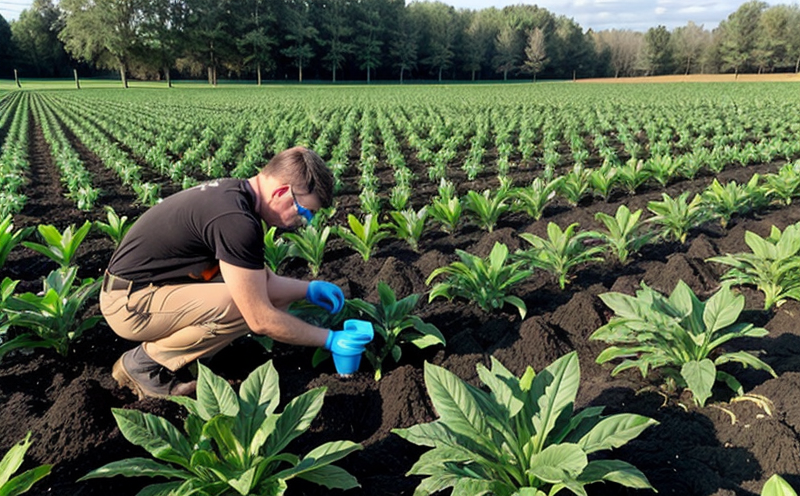Fertilizer Ash Content Testing
The process of Fertilizer Ash Content Testing is crucial in ensuring that fertilizers meet specified nutrient content and purity requirements. This testing procedure involves the complete combustion or incineration of a fertilizer sample to produce an ash residue, which represents the inorganic elements present in the fertilizer. The percentage of this ash relative to the original weight of the sample provides insights into the mineral content and potential impurities.
The primary goal of this test is to determine the total inorganic matter (TIM) or ash content of a fertilizer product. This information is vital for quality assurance, compliance with international standards, and ensuring that fertilizers meet customer expectations regarding purity and effectiveness. The ash content can also indicate the presence of harmful substances such as heavy metals or other contaminants.
The testing procedure typically involves precise sample preparation to ensure accurate results. Samples are weighed accurately, and then combusted in a muffle furnace under controlled conditions at temperatures exceeding 850°C. This high-temperature combustion ensures complete decomposition of organic materials while leaving behind only the mineral content as ash. After cooling, the resulting ash is carefully weighed again.
The precision and accuracy of this test are paramount for reliable results. Proper sample preparation and consistent testing methodologies ensure that the data generated can be trusted by stakeholders across various sectors including agriculture, horticulture, and forestry. Compliance with international standards such as ISO 17266:2013 ensures consistency in methodology and reporting.
The importance of this test extends beyond just quality assurance; it also plays a role in environmental considerations. By accurately determining the ash content, users can better understand how much mineral matter is being introduced into soil systems, which helps prevent over-fertilization and associated environmental impacts.
Understanding the nuances of fertilizer ash content testing allows for more informed decision-making regarding nutrient application rates and potential risks associated with certain types of fertilizers. This knowledge supports sustainable agricultural practices by promoting efficient use of resources while minimizing adverse effects on ecosystems.
In summary, fertilizer ash content testing is an essential tool in maintaining product quality and ensuring compliance with industry regulations. Its role in providing accurate measurements of mineral matter contributes significantly to both environmental stewardship and economic efficiency within the agriculture sector.
Benefits
The benefits of conducting thorough fertilizer ash content tests are manifold, particularly for industries reliant on precision nutrient management. By accurately measuring the total amount of inorganic material present in fertilizers, these tests offer several advantages:
- Improved Product Quality: Ensures that products consistently meet desired specifications and customer expectations.
- Informed Decision-Making: Provides valuable insights into potential risks associated with specific types or batches of fertilizer.
- Regulatory Compliance: Helps ensure adherence to national and international standards, thereby reducing legal risks.
- Sustainable Practices: Supports environmentally friendly practices by minimizing unnecessary inputs and waste generation.
Achieving these benefits enhances operational efficiency across all levels of the supply chain, from raw material procurement through manufacturing processes down to final application in fields or forests. Furthermore, accurate ash content measurements contribute positively towards long-term sustainability goals by promoting responsible resource management practices.
Eurolab Advantages
At Eurolab, we pride ourselves on delivering exceptional service and unparalleled expertise when it comes to fertilizer ash content testing. Our advanced facilities and cutting-edge instrumentation allow us to provide precise and reliable results that meet or exceed international standards.
- State-of-the-Art Equipment: Utilizing modern laboratory equipment ensures consistent accuracy in all tests conducted.
- Experienced Technicians: Our team comprises highly skilled professionals who are committed to providing accurate, timely results.
- Comprehensive Reporting: Providing detailed reports that include raw data and interpretations helps customers make informed decisions easily.
- Global Recognition: Eurolab is ISO 17266:2013 compliant, ensuring our methods align with recognized global standards.
By leveraging these advantages, we strive to offer clients peace of mind knowing that their fertilizer ash content testing needs are being met by a trusted partner committed to excellence. Whether you require routine quality checks or one-off assessments for special projects, Eurolab can accommodate your requirements efficiently and effectively.
Competitive Advantage and Market Impact
The ability to accurately measure fertilizer ash content offers significant competitive advantages in today’s market where sustainability and efficiency are key drivers. For companies involved directly with agriculture or forestry, having reliable data on the mineral composition of fertilizers can help optimize production processes, reduce costs, and improve overall performance.
- Enhanced Reputation: Accurate test results enhance brand reputation by demonstrating commitment to quality and adherence to high standards.
- Better Resource Utilization: By understanding exactly what elements are being added via fertilizers, businesses can tailor their practices more closely to actual needs, reducing waste and increasing effectiveness.
- Increased Customer Trust: Transparent communication about the content of products builds trust with customers who value transparency in sourcing and production methods.
In addition to these internal benefits, accurate fertilizer ash testing also contributes positively to broader market trends towards more sustainable agricultural practices. As consumers become increasingly aware of environmental issues related to overuse or misuse of fertilizers, suppliers that can demonstrate robust quality control measures will find themselves better positioned in the marketplace.





